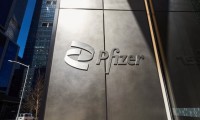-
Innovent sells its share in CAR T-cell therapy to IASO Bio for 18% equity
- Source: drugdu
- 86
- July 9, 2024
-
Phase III Trial Data Presented at ASCO Show Imfinzi Improves Survival in Limited-Stage Small Cell Lung Cancer
- Source: drugdu
- 129
- June 6, 2024
-
The Crick announces new partnerships with SMEs and MRC for research
- Source: drugdu
- 87
- June 4, 2024
-
Insmed’s Trial Results Pave Way for FDA Filing in a Lung Disease With No Approved Therapies
- Source: drugdu
- 99
- May 30, 2024
-
Datopotamab deruxtecan demonstrates positive results in TROPION-Lung01 Phase III trial
- Source: drugdu
- 103
- May 29, 2024
-
Roche targets obesity market with early positive trial data
- Source: drugdu
- 108
- May 20, 2024
-
Blackstone Unveils Immunology Startup With $300M and a Phase 2-Ready Drug From Merck
- Source: drugdu
- 79
- May 17, 2024
-
Gilead writes $2.4B off Trodelvy as CEO underscores ‘time of focused execution’
- Source: drugdu
- 128
- April 30, 2024
-
Pfizer scores FDA nod for hemophilia B gene therapy, will charge $3.5M per dose
- Source: drugdu
- 87
- April 30, 2024
-
Enhertu Gets FDA Accelerated Approval for Unresectable, Metastatic HER2-Positive Solid Tumors
- Source: drugdu
- 129
- April 10, 2024
your submission has already been received.
OK
Subscribe
Please enter a valid Email address!
Submit
The most relevant industry news & insight will be sent to you every two weeks.













